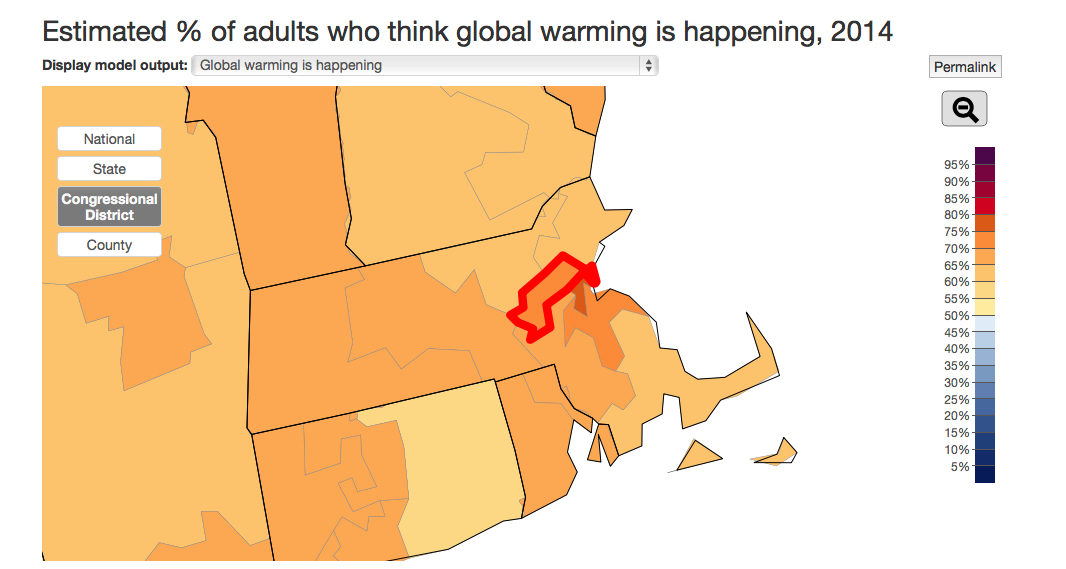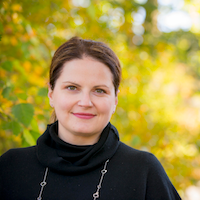I’ve been doing a fair bit of traveling lately, and although generally exhausting, traveling is great for playing podcast catch-up. I had been hopelessly behind on most podcasts, especially Science Friday. But I have been diligently listening away in airports, airplanes, cars and cabs and finally, last night, I got to last week’s Science Friday. Not only did I gain a sense of accomplishment (hey, it’s the little things, right?) but I also gained blog inspiration!
Anthony Leiserowitz is the director of the Yale Project on Climate Change Communication and a frequent Science Friday guest. Last week he came on the show to talk about the Project’s new statistical model and interactive map that estimates public understanding of climate change right down to the level of congressional districts. It’s a very cool tool, and surprisingly, it doesn’t bear all bad news. It turns out, across the country, a majority of Americans—between 54 and 72 percent—believe that climate change is happening. Hooray—but man, that should be a lot higher.
The model does, however, uncover mostly bad news. Here’s how Leiserowitz summed it up:
Americans still have no idea that most scientists have agreed and are convinced, based upon the evidence accumulated over many many years, that climate change is in fact happening and human-caused. We see that nationally only about half of Americans understand that and it’s as low as 42% in the state of Wyoming. There is a lot of misunderstanding about even the basic scientific consensus that this is actually a real problem.

Sigh.
But here’s the "Well Said!" part. Host Ira Flatow asked Leiserowitz, “why?” and in response Leiserowitz deftly and clearly explained the roles of the media, doubt merchants, and scientists. About the media, Leiserowitz said,
For many years, the media loves to [feature] conflicting viewpoints. It’s been called “false balance.” So you put a climate scientist up against another person who denies that climate change is real, or human-caused, or a serious problem. And so for most viewers at home, they look at that and they say well, there’s one viewpoint versus another viewpoint. It looks like scientists are still arguing. It’s a 50-50 split. So, that’s maybe appropriate in a political debate, between Democrats and Republicans, [but] it’s not appropriate when you’re looking at the conclusions of established science, where it’s well over 97% of scientists who are convinced that climate change is happening.
I love that summary, but it’s nothing terribly new. After all, as Flatow noted, comedian John Oliver pointed this out brilliantly in a segment last year. Still, it’s always good to hear this message, and Leiserowitz stated it crisply, as well as anyone could without the benefit of Bill Nye and/or profanity: It’s a false balance. There are not two equally supported scientific sides. It’s not 50-50, it’s more like 97-3.
Next, Leiserowitz recaps the main points of Merchants of Doubt, namely that a well-funded and well-organized campaign of disinformation has successfully repackaged tobacco-lobby strategies to confuse the public about climate change. It’s when Leiserowitz got to talking about scientists, however, that I knew I’d have to write up a quick post. Here’s what he said:
Scientists bear some responsibility here, too. Scientists aren’t very good communicators in general, and we aren’t very active about making sure people understand the things that we all understand. Look, as scientists, we get all of our credit and the approval of our peers for being at the cutting edge…we don’t spend a whole lot of time trying to review the things that everybody in the field already accepts. So that’s partly our fault. We need to do a much better job of helping Americans to understand: Here’s what we all know. The basics: It’s real. It’s human-caused. And it’s bad.
Yes, yes, a million times yes! Scientists have to engage with the public—not by recapping every minute detail of their own research no matter how relevant to pressing issues, but by helping to catch everyone up on the basics. A climate scientist’s new model of (say) how particulate load is affecting albedo will not make a dent in public perception of climate change until everyone understands what climate change is and why it is happening. There is a strange dichotomy that I’ve become aware of lately—most people think scientists are smart and trustworthy, and yet most people do not understand basic science. I think we can help move the needle on the latter by leveraging the former—but only if scientists are willing to take the time to explain—in non-jargony terms—the principles and facts that they take for granted.
So for calling out the critical role of scientists in efforts to improve public understanding of climate change, I say, Well Said, Anthony Leiserowitz!
Are you a teacher and want to tell us about an amazing free resource? Do you have an idea for a future Misconception Monday or other post? See some good or bad examples of science communication lately? Drop me an email or shoot me a tweet <at>keeps3.

